- Home
- Shirley McKay
Fate and Fortune Page 10
Fate and Fortune Read online
Page 10
In that first, desperate moment, he clung to the door, as though some residue of hope might filter through its cracks. Then forcing down his fear, he turned to face the cell. Though the stench was overwhelming, he knew that he would soon grow used to it, and that appalled him more. For when his stomach had ceased to lurch and rebel, and he no longer noticed the stink of decay, he would himself be part of it, absorbed into its core. Breathing shallow as he could, he felt his way about the space in front of him. The cell was no more than five feet by seven, small enough for him to touch the walls from its centre, high enough, at least, for him to stand. As he became accustomed to the darkness, he saw a trace of light; a tiny grating opened upwards, admitting a pinprick of daylight, or perhaps, on cloudless nights, the glimmer of the moon, and through this grate the trickle of the rain had washed the squalor of the street. The walls were streaked with filth, and the straw below the grate, that once had been a bed, was clogged and moist.
Hew curled up by the door, in the driest corner he could find. The dampness of the air that seeped through to the bone did nothing to obliterate the stench. He took off his leather knapsack, which became his pillow, and drew a curious comfort from its scent. He closed his eyes and tried to picture in its place the warm flank of Dun Scottis, the earthy April showers, the sweetness of the sunshine and the rain. And exhausted, cold and hungry, in this dark and hollow place, he fell asleep.
The Devilmaster
It was the cold that woke him, creeping insidiously into his bones. He woke long before the light. Gradually, though, the sun rose in the sky and a pinkish, milky daylight filtered through the grate. Outside, he heard murmuring, as though a crowd had formed. He heard a far off hammering, and somewhere up above, a deep, metallic clang. He understood these sounds, and tried to shut them out. Then as the sun climbed higher still he heard the sounds of commerce from the luckenbooths, along the northern aspect of St Giles. He allowed his mind to shape them into flesh: a fishwife fresh from Leith, with panniers full of haddocks; limp-eyed ponies, laden, trotting over stones; the ringing of the kirk bells, calling in the day, the harrying of children late for school. He imagined the booksellers, setting up their stalls, a prayer book for the kirkman who hurried to St Giles, a thrilling piece of tattle for his wife. He heard the market criers, sweet and mournful like the gulls: caller herring, who will buy; neaps like succar; leeks and kale. He tried to bring to life the textures and the scents, pungent oils and vinegars, dripping from a sponge, and slabs of yellow butter wrapped in muslin cloth. Yet he could not overcome the prison vault, the dark and putrid dankness of the gaol, where he left no mark upon the passing world.
His eyes had already become focused to darkness when the gudeman came to let him out. Someone called, ‘God’s truth! Can it be you?’ And he was standing in the light, in the gaze of Richard Cunningham, who met him with an air of such amused benevolence he could have wept.
He said simply, ‘Master Cunningham, I am truly glad to see you, sir,’ and haplessly, hopelessly, held out his hand.
Richard broke into a smile, and clasped Hew in his arms in a quick and warm embrace, recoiling, somewhat briskly, from the smell.
‘I should think you are,’ he answered humorously. ‘You are a little altered since we met.’
‘This is Master Cullan, and my friend,’ he confirmed to the gudeman. ‘There has been a mistake here, which I shall redress. Meanwhile I will take him in my charge.’
He removed from a pocket a purse of gold coin, which he tossed to the gaoler intact. The gudeman retreated, well pleased with his spoils.
Richard rubbed his beard. ‘The question is,’ he said to Hew, ‘what we should do with you now. I have some pressing business in the court room, where I dare not take you, in your present state. I think it may be preferable to send you to my house. My clerk here,’ he gestured to a man behind, ‘will show you the way.’
‘In truth, I am in no fit state to grace your home,’ Hew admitted awkwardly.
‘Andrew will explain it to my wife.’
Richard drew the man aside, for a hurried consultation. Then he smiled at Hew. ‘Now I must take my leave, and put this matter right.’ He moved on swiftly to the entrance of the council house, at the south west quarter of St Giles.
The clerk spoke impassively to Hew, in a tone that suggested he had seen it all before, and would not stoop so low as to remark upon it. ‘Will you follow, sir?’ He led Hew back into the lawnmarket, where the voices he had heard were given form and faces in the dizzy, urgent pressing of the crowd. Hew drank in deep draughts of air, with all its mingled pungency of sweetness and decay, grateful to be part of the returning world.
They had come to a stop at a tall land on a tenement that looked upon the street, with a forestair leading upwards to a wooden gallery. Only then did the servant pause to look at Hew, with a hint of scepticism. ‘Perhaps it would be best,’ he allowed at last, ‘if you wait here.’
Hew stood a little further from the door, afraid that it would appear that he was loitering. The high street had a rough, ramshackle air, quite different from the leafy thoroughfare of South Street in St Andrews, where the merchants built their houses on neat and ordered rigs. The lands upon the tenements appeared to crane their necks towards the sun. Like plants starved of light they pushed their straggled shoots up vainly to the smallest prick of sky. Everything was pushed upwards, striving for the mountains where the air was clean, leaner and lankier, stretched towards the sun. Timber frames and forestairs sprouted ever up and outwards, until the whole town twisted like a turnpike, rising to the castle, straining round the galleries that spilled into the street. Hew kept a watchful eye out for the bailies. A fruitman stood close to the house, selling baskets of apples and wardens, long-wintered, weathered and worn, and trays of dried medlars and plums.
Presently, the clerk returned, and honoured Hew with a contemptuous smile, that flickered round the edges of his lips.
‘Done,’ he said laconically. ‘Go up to the kitchen there.’ He led Hew to the side door in the close, and pointed to a turnpike stairway. ‘Second opening on the left, on the second floor.’
Hew found himself inside a warm and well-lit room, as large as Jonet’s cottage, that contained a roasting spit before a blazing fire. A dressing board was set with bread and butter, and a plate of mutton, thickly sliced. A low door opened to his right, and a little maid emerged, with a jug of frothing beer. She placed this on the board beside the bread and indicated through a string of squeals and gestures that he was to eat. Her duty done, she fled, as though she saw the devil supping at her hearth. Hunger overcame Hew’s inhibitions, and he made short work of the meal. He was wiping his mouth with the last piece of bread, when the kitchen door opened, and a child of six or seven peeped inside. She giggled as he smiled at her, clasping her fingertips close to her mouth, and let the door slam, darting away. Hew groaned. Once again, he was a fool for maids and bairns to gawp at.
The little girl was followed in a moment by her mother, who stood calm and curious, with her daughter peeking shyly from her skirts. Hew rose abruptly, startled into awkwardness, conscious of his squalid state of dress.
‘Master Cullan – Hew – you are welcome here.’ The mistress of the house regarded him with clear and candid gaze. She held out her hand, with a grace that he dared not return. ‘I am Eleanor Preston,’ she said softly. ‘The servant will send for a surgeon, to attend to your hurts.’
‘No surgeon, I implore you,’ Hew protested. ‘I am only scratched and bruised. I would not be bloodied as well.’
Eleanor raised an eyebrow, and answered with a mother’s patience for a dear but vexing child. ‘Well then, if you prefer, you shall have the apothecary. Come up to the loft; there is a room prepared.’
Hew followed her up the turnpike stair. Richard’s house appeared to be arranged on several floors, and he had lost his bearings from the street. At its very top they came into a space that overlooked the close, furnished with a writing desk and bed.
/>
‘I hope you may be comfortable,’ Eleanor said. ‘I will bring up what you need. Soap and water, I should think,’ she inferred discreetly. She left him on his own, to wait for the apothecary. This man was polite though perfunctory in his attentions, and Hew began to suspect that the stench of the tolbooth, to which he had in some part grown accustomed, lingered more stubbornly than he had supposed. He wished for Richard to come home, to offer him a proper conversation, and restore his sense of self. Under the apothecary’s quizzical eye, he felt like one of Giles Locke’s specimens, floating in a jar and of dubious provenance.
As the apothecary took his leave, the mistress of the house returned, with a suit of clothes. ‘Aye, you were right,’ Eleanor smiled. ‘Only bruised. The man will make up a salve.’
It felt strange to Hew to be mothered in this way, for the second time in as many weeks, and he hoped she would not ask him to undress. She held out the clothes for inspection. ‘These will do, I think. Richard’s last prentis left them behind. They are a little worn for wearing in the court, but will serve until you have new. You can throw your old ones on the fire.’
‘I thank you. But I think perhaps you have misunderstood,’ Hew answered politely. ‘I am not Richard’s prentis.’
‘Oh?’ she looked surprised. ‘But you are Matthew Cullan’s son?’
‘For certain, aye.’
‘Then there is nothing more to say.’ She smiled at him again. ‘In any case, you will be glad to change your things. Have you all that you require?’
‘But for soap and water,’ Hew reminded her.
Eleanor hesitated. ‘I talked with the apothecar. I fear he is opposed to washing, as the witches recommend, in times of hurt and sickness. He believes warm water opens up the skin and makes it ripe for pestilence and putrefaction, such as is rife in … in the place where you most recently were … incommoded,’ she concluded tactfully.
Hew sighed. He wanted nothing more fervently than to rid himself of that stain, the taint of the gaol, its creeping stench and shudder on his skin.
‘I have heard that argument,’ he pleaded, ‘and my brother-in-law, who is a most renowned physician, until quite recently subscribed to it, but my sister, who is wiser yet than anyone I know – though she is not a witch, of course,’ he capitulated hurriedly, ‘– has succeeded in persuading him otherwise, and now he is convinced not only does washing not cause putrefaction but a little soap and water judiciously applied may oftentimes discourage it.’ He spoke like Giles, he realised sadly, in this curious circumvention.
‘That is not an argument we often hear in town. But nonetheless,’ Eleanor gave a thoughtful nod towards the counterpane, which did not look likely to wash well, ‘you may have soap and water. Richard has a bath vat in his closet,’ she admitted, as an afterthought, ‘though it takes some time to fill.’
This, Hew sensed, was a step too far. ‘Soap and water, and some towels,’ he assured her, ‘will suffice. I thank you for the clothes. But I should like to keep the others if I may.’
Eleanor stared. ‘You can have no further use for them.’
Hew grew hot beneath her gaze, so benignly sceptical. ‘I mean to return them to the gude wife who lent them,’ he explained.
‘They are noxious, Hew,’ she told him gently, as she might warn a child, who had simple understanding, and as little sense.
‘They belonged to her son, who was drowned.’
‘Then leave them by the door, to be washed and aired. You shall not take them back to her, tainted with the tolbooth,’ Eleanor said gently.
It was pity at his tale, perhaps, that she forgot her inhibitions in the naming of the place.
‘Mistress, I thank you, I cannot repay your kindness. I am truly sorry, to have brought the filth of the gaol to your house,’ answered Hew.
‘As to that, think nothing of it. It serves as a timely reminder that that dreadful place is not so far away. Now, I will leave you to dress. Richard will be home soon. You will find us in the hall, taking supper. I knew you and your sister both when you were children,’ she said kindly as she left.
The timid maid returned with basin, jug and towels, and Hew scrubbed clean the remnants of the gaol. Washed and dressed, he closed his eyes for a moment on the bed, and in a moment more, he fell asleep. He woke with a start to the sound of voices below, splashed his face again quickly and combed through his hair. Now sleepily presentable, he made his way downstairs.
He found the family all together in the hall. The room opened out through high, half-shuttered windows to a timber gallery. When the windows were left open to allow the air the house looked down upon the marketplace, a light and airy loft above the noise and dust, lifted from the clamour of the street. With the shutters closed, the hall was dark and intricate, lapped in quiet lamplight and the subtle, secret stirrings of the fire. In the cool April evening, Eleanor allowed for both; she left the windows open to the last pale trace of sunlight as she lit the fire. The long meat board was set before the window, with a white-work cloth, and beside it stood the linen stand, with water bowls and washing cloths. The table had been set with pewter bowls and cups, though Richard had a drinking cup of silver, and a set of silver spoons. There were fruit dishes, bread bowls and butter plates, and saucers of pickles and salt. Besides, there was a linen press, and a French oak dresser, together with a walnut stand bed, plump with cushions, in the corner by the hearth. Eleanor had woven fabrics bright with flowers, in russet, gold and primrose, picking out the colours of the flames. The walls were coloured white and hung with painted cloths. The whole seemed light and intimate, a public and a private space, both close and distant to the town.
Richard was sitting on the settle by the fire, with his little daughter in his lap. A young boy sat reading, curled on the floor at his feet. As Hew entered, Richard smiled. ‘You look a little better now.’
‘He stinked before,’ the little girl said candidly.
‘That is rude,’ rebuked Richard.
‘True, though.’ Hew winked at her.
‘Why?’ The boy by the fireside closed his book and gazed at Hew with curious grey eyes. Eleanor replied, ‘It is ill-mannered to remark upon the smell.’
‘I meant, why did you stink?’ The boy gazed closely at Hew, his interest implacable.
‘I was in a bad place,’ Hew said apologetically, ‘and I am grateful to your parents to be out of it.’
‘He was in the gaol,’ the girl said unexpectedly. Then she saw her parents’ warning looks, and capitulated hurriedly, ‘That was what my nursemaid said.’
Eleanor sighed, ‘Servants talk.’
‘I have thought for some time,’ Richard frowned, ‘that Grace is too old for a nurse.’
The little girl pouted. ‘I like her.’
‘We will speak of it later,’ Eleanor suggested. ‘Master Cullan, these are our children. Roger is twelve, and at the grammar school, and Grizelda, whom we all call Grace, has recently turned six. James, our elder son, is studying at St Leonard’s.’
‘So I understand. Grizelda is a pretty name.’ Solemnly, he extended a hand to the child.
‘I had a sister Mary, but she died last spring,’ the little girl confided.
‘I am truly sorry to hear it.’ Hew looked at Eleanor, who smiled bleakly. Richard cleared his throat.
‘Thank you. I’m afraid to say, we have rather made a pet of Grace, since Mary’s death. Forgive my children’s manners, Hew.’
‘There’s nothing to forgive,’ Hew returned politely.
‘Why were you in the gaol?’ the boy persisted.
‘Enough!’
Hew was surprised at the force of Richard’s tone, and the boy shrank back into the shadow of the fire.
After supper, Eleanor left the room with the children, while Richard poured two cups of claret wine.
‘Feeling better now?’ he asked ironically.
Hew sipped the wine. ‘In truth, I cannot thank you enough.’
‘Pray, do not mention it.’
‘Richard, there was a woman hanged today.’
‘Aye, a common thief. Put it from your mind.’
‘But they took her children.’
‘So I heard. I saw the man myself – Sinclair’s grieve at Dysart – coming for the bairns.’
‘Dear God!’ You mean they are to work the pits?’
‘It is the way of things,’ Richard sighed. ‘Hew, take my advice and do not waste your pity. The woman is dead, and her children are gone. To succeed at the bar, you must harden your heart. You are too soft, but I shall teach you yet.’
‘As to that, I have no wish to be taught,’ Hew replied. ‘For all of your kindness, I think you have misunderstood. I did not come here as your prentis, but on business of my father’s.’
‘Now that is unfortunate,’ Richard answered dryly. ‘For you are my servant and my prentis, bound to me for a year from this day, on which terms I vouched twenty pounds before the magistrate, securing your release from the charge of vagrancy.’
Hew stared at him aghast. ‘You bought me?’
‘Aye, I had to. Don’t you know the law?’ Richard burst out laughing at the expression on Hew’s face. ‘Have no fear; I will not hold you here against your will. But would it really be so bad? Consider, won’t you stay? It would please me well. Can it really be so irksome to you? Try it for a week or two, and if it does not suit you, I will be content to let you go.’
Hew shook his head. ‘I have other interests here. Forgive me, Richard. I’ll repay the debt, when I restore my credit.’
‘Peace, there is no debt,’ Richard protested. ‘As to your credit, I can lend you what you need to make your journey home, if that is your intent. You cannot think that I would keep you here against your proper will. And for your business, perhaps I may help.’
In the face of such reasoned kindness, Hew felt ashamed. ‘My father had interests in a printer,’ he explained, ‘called Christian Hall. The debt is somewhat large.’
‘Christian Hall, you say? I do not know the press.’

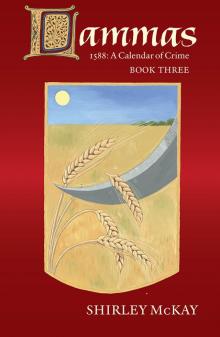 Lammas
Lammas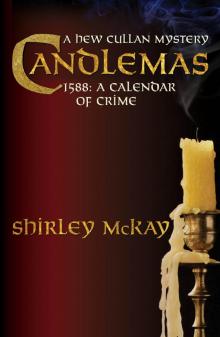 Candlemas
Candlemas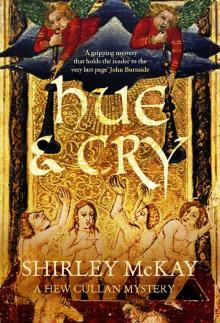 Hue and Cry
Hue and Cry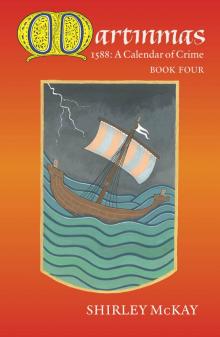 Martinmas
Martinmas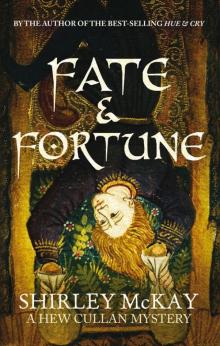 Fate and Fortune
Fate and Fortune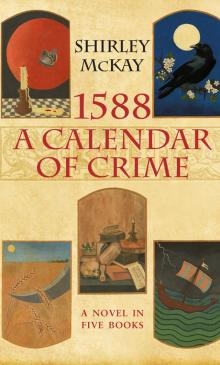 1588 A Calendar of Crime
1588 A Calendar of Crime Time and Tide
Time and Tide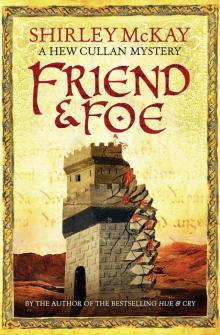 Friend & Foe
Friend & Foe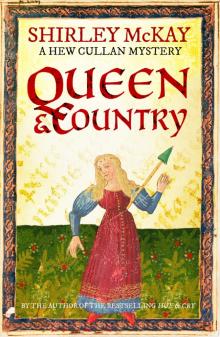 Queen & Country
Queen & Country